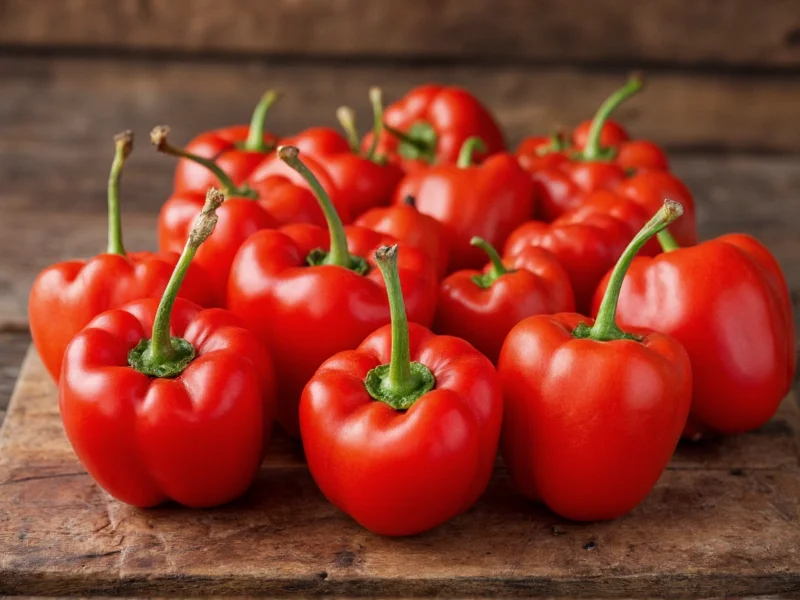If you've ever reached for sweet paprika only to find your container empty, you're not alone. This versatile spice adds both vibrant color and a distinctive mild, slightly sweet flavor to dishes ranging from Hungarian goulash to roasted vegetables. Understanding the best sweet paprika substitute for recipes requires knowing what makes this spice unique and how different alternatives affect your final dish.
What Makes Sweet Paprika Special
Sweet paprika, primarily made from ground sweet red peppers, delivers a vibrant red color and a mild, slightly sweet flavor without significant heat. Unlike its spicy counterparts, authentic Hungarian sweet paprika contains no capsaicin heat. This distinguishes it from hot paprika varieties and makes it essential in traditional dishes where color and subtle pepper flavor matter more than spiciness.
Top Sweet Paprika Alternatives Ranked
Not all substitutes work equally well in every situation. The best alternative to sweet paprika in cooking depends on which characteristic you need to replicate most—color, sweetness, or mild pepper flavor.
1. Smoked Paprika (Pimentón)
While not identical, smoked paprika provides similar color with a deeper, woodsy flavor. Use 3/4 teaspoon of smoked paprika for every 1 teaspoon of sweet paprika required. This substitution works exceptionally well in stews, rubs, and roasted dishes where the smoky note complements other ingredients. For Spanish-inspired recipes, this might even enhance the dish.
2. Bell Pepper Powder
Commercially available bell pepper powder offers the closest flavor match without heat. Since it lacks the concentrated flavor of paprika, use 1.5 times the amount called for in your recipe. For homemade bell pepper powder, dehydrate red bell peppers thoroughly before grinding to a fine powder. This sweet paprika replacement without spice works perfectly in dishes where heat sensitivity matters.
3. Mild Cayenne Blend
For recipes where color matters most, combine 1/2 teaspoon mild cayenne pepper with 1/2 teaspoon garlic powder and 1/4 teaspoon sugar. This blend mimics both color and sweetness while providing minimal heat. This approach serves as an excellent sweet paprika substitute for sensitive palates when used sparingly.
4. Tomato Powder
Tomato powder provides similar red coloring with a complementary flavor profile in tomato-based dishes. Use 1 teaspoon tomato powder plus 1/8 teaspoon onion powder to replace 1 teaspoon sweet paprika. This alternative works particularly well in sauces, soups, and braises where tomato flavors enhance rather than compete with the dish.
| Alternative | Ratio | Best For | Flavor Notes |
|---|---|---|---|
| Smoked Paprika | 3/4:1 | Stews, roasts, rubs | Adds smoky depth, slightly stronger flavor |
| Bell Pepper Powder | 1.5:1 | Color-sensitive dishes | Mildest option, closest flavor match |
| Cayenne Blend | 1:1 | Dishes needing color | Slight heat, add sugar for sweetness |
| Tomato Powder | 1:1 + seasonings | Tomato-based recipes | Complements acidity, less sweet |
What NOT to Use as Sweet Paprika Substitutes
Some common suggestions fall short as proper sweet paprika alternatives. Chili powder often contains cumin and oregano, which dramatically alter flavor profiles. Paprika oleoresin is too concentrated for direct substitution. Red food coloring provides color but no flavor dimension. Understanding these limitations prevents disappointing results when seeking a sweet paprika substitute for Hungarian dishes that rely on authentic flavor profiles.
Adjusting for Different Dish Types
The ideal how to replace sweet paprika in dishes depends on your specific recipe:
- Cold dishes (salads, dips): Bell pepper powder works best as it won't intensify in flavor over time
- Long-cooked dishes (stews, soups): Smoked paprika develops beautifully during cooking
- Dry rubs: A tomato powder blend maintains consistent flavor without burning
- Delicate sauces: Strain tomato powder through a fine mesh sieve for smooth texture
Storage Tips for Paprika and Alternatives
Paprika loses potency quickly when exposed to light and air. Store in an airtight container away from heat sources. Most alternatives follow similar storage requirements, though homemade bell pepper powder may have a shorter shelf life (3-4 months) compared to commercial paprika (6-8 months). Proper storage ensures your sweet paprika replacement options maintain maximum flavor when you need them.
Creating Your Own Custom Blend
For the most versatile sweet paprika alternative for recipes, create a house blend: combine 2 parts bell pepper powder, 1 part tomato powder, and 1/4 part garlic powder. Store in a dark glass jar and use within 3 months. This blend works across most applications where sweet paprika would normally feature, providing both color and balanced flavor without unexpected heat.











 浙公网安备
33010002000092号
浙公网安备
33010002000092号 浙B2-20120091-4
浙B2-20120091-4